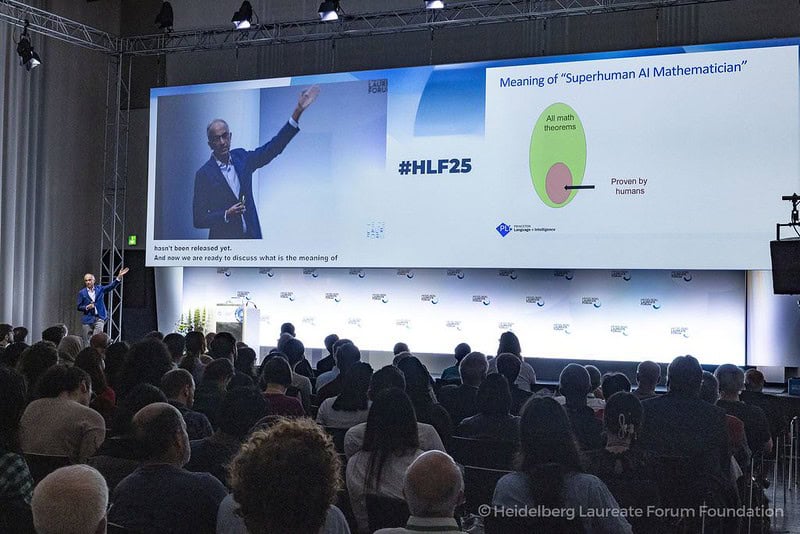Science
AI Mathematicians: Are Human Jobs at Risk in the Future?

The emergence of generative artificial intelligence (AI) is reshaping numerous professions, including mathematics. Researchers at Microsoft recently identified “mathematician” as one of the 40 jobs likely to be significantly impacted by this technology. At the Heidelberg Laureate Forum (HLF), experts discussed the growing capabilities of AI in mathematics, leaving many human mathematicians to consider their future roles.
During a panel discussion at HLF, Yang-Hui He, a mathematical physicist at the London Institute for Mathematical Sciences, expressed a mix of excitement and concern regarding AI’s advancements. He acknowledged his enthusiasm for AI, having authored a textbook on its applications in mathematics and promoted machine-learning methods since 2017. However, He raised a poignant question: “Where is our place?” His concerns stem from AI’s ability to excel at mathematical tasks without a genuine understanding of the subject.
The panel highlighted the ways in which current generative AI systems are outperforming human mathematicians. Sanjeev Arora, a theoretical computer scientist, noted that AI’s tireless nature contributes to its superior performance. He remarked, “The reason it’s better than humans is that it’s basically tireless.” This development mirrors a sentiment expressed by mathematician Alfréd Rényi, who once referred to mathematicians as “machines for turning coffee into theorems.” With AI, the need for coffee is eliminated.
Arora elaborated on how AI can utilize reinforcement learning to enhance its mathematical capabilities. In this approach, AI models receive a collection of questions, generate numerous solutions, and refine their methods based on human-verified correct responses. Given the formalized nature of mathematics, Arora believes AI could soon replace human correctness checkers with “proof assistants.” He is actively developing one such assistant, called Lean, with colleagues at Princeton University.
The discussion extended beyond merely solving problems. Arora proposed that AI could also generate mathematical questions and even write, peer-review, and publish research papers. Many colleagues, including Javier Gómez-Serrano from Brown University, agreed with the potential of AI in advancing mathematics. Gómez-Serrano remarked on the rapid progress, stating, “AI is already generating results in a day or two that would previously have taken a human mathematician months.”
While the panel celebrated AI’s capabilities, Maia Fraser from the University of Ottawa sounded a cautionary note. She expressed concern about the pace of these changes and their implications for the profession. “My concern is the speed of the changes,” she said, emphasizing the importance of considering whether such advancements align with human intentions.
Fraser pointed out that while AI cannot be un-invented, society has agency over its direction. She questioned whether a future dominated by AI mathematicians, potentially sidelining human involvement, is desirable. In contrast, He seemed more optimistic about the future, humorously contemplating the possibility of witnessing a proof of the Riemann hypothesis. He remarked, “If that means that human mathematicians become priests to oracles, so be it.”
The discussions held at the Heidelberg Laureate Forum reveal a complex landscape for the future of mathematics and the role of AI. As generative AI continues to evolve and take on more responsibilities, the mathematics community faces crucial questions about its future and the balance between human intellect and artificial capabilities.
-

 Health2 months ago
Health2 months agoNeurologist Warns Excessive Use of Supplements Can Harm Brain
-

 Health2 months ago
Health2 months agoFiona Phillips’ Husband Shares Heartfelt Update on Her Alzheimer’s Journey
-

 Science2 weeks ago
Science2 weeks agoBrian Cox Addresses Claims of Alien Probe in 3I/ATLAS Discovery
-

 Science2 weeks ago
Science2 weeks agoNASA Investigates Unusual Comet 3I/ATLAS; New Findings Emerge
-

 Science2 weeks ago
Science2 weeks agoScientists Examine 3I/ATLAS: Alien Artifact or Cosmic Oddity?
-

 Entertainment4 months ago
Entertainment4 months agoKerry Katona Discusses Future Baby Plans and Brian McFadden’s Wedding
-

 Science1 week ago
Science1 week agoNASA Investigates Speedy Object 3I/ATLAS, Sparking Speculation
-

 World2 months ago
World2 months agoCole Palmer’s Cryptic Message to Kobbie Mainoo Following Loan Talks
-

 Entertainment3 months ago
Entertainment3 months agoEmmerdale Faces Tension as Dylan and April’s Lives Hang in the Balance
-

 Science1 week ago
Science1 week agoNASA Scientists Explore Origins of 3I/ATLAS, a Fast-Moving Visitor
-

 Entertainment4 months ago
Entertainment4 months agoLove Island Star Toni Laite’s Mother Expresses Disappointment Over Coupling Decision
-

 Entertainment2 months ago
Entertainment2 months agoMajor Cast Changes at Coronation Street: Exits and Returns in 2025









